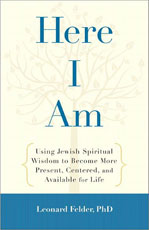"Several years ago I had the opportunity to counsel an aging survivor of the concentration camps — a smart and irrepressible Jewish woman in her seventies, who was struggling with a horrible illness that was taking away her mobility and her independence. I remember looking into this woman's intense eyes and asking her, 'What do you say to yourself each morning to give yourself the strength to carry on?'
"She smiled a mischievous smile and explained, 'I'm very stubborn and defiant. If someone tries to take away my freedom or my humanity, I dig in my heels and make sure they are not able to control my thoughts and actions. I remember, when I was a little girl, my grandfather used to say whenever something horrible or painful was happening to us, "Gam zu l'tovah. Even this might eventually be turned into something good." Saying those words defiantly and silently in my most distressing moments have taken me out of a place of helplessness and passivity. What I've learned in my life is that even when my mobility or physical health is compromised, I can still passionately hold on to my deepest values and look carefully for ways to do something positive and helpful. That's something no one will ever take away from me.'
"I think of this woman often when things are difficult in my own life. I envision her when she was a teenager in the concentration camps or as an aging grandma in my office. I bring to mind her playful smile as she responded defiantly to the tragic moments in her life and said silently, 'I will continue to look for ways to emerge from hopelessness and helplessness. Gam zu l'tovah. I will find a way to turn even this into something that has compassion or goodness.' . . .
"One of the additional things I like about the phrase 'Gam zu l'tovah. Even this could possibly be for the good' is that it has a humble openness and a gentle curiosity about it. The Hebrew words have a rather Zen-like equanimity about them, as you essentially say to yourself, 'I am going to breathe calmly and keep my heart open to all the various possibilities, even though I am witnessing a lot of pain and distress right now.' Rather than reacting abruptly with a sense of panic or impatience to an upsetting event, you are able to step back and say gently, 'I am open to something positive happening somewhere down the road, even if I don't know what that might be or how soon it might occur.'
"This may not be easy if you tend to be a person who likes things to be resolved quickly. To step back and keep your heart open when your world has been turned upside down does not come automatically for most people. But when you silently and calmly say, 'Gam zu l'tovah. Even this could possibly be for the good,' it helps you to slow down and not expect immediate results to occur. Because to be honest, we often don't know exactly why something horrible happens or how long the pain and chaos will last. From our limited human perspective, we frequently don't understand why a tragic or painful situation happens to a good person or how long it will take him or her to get on solid footing again.
"At a moment when superficial explanations simply cannot begin to fathom the unfairness or the suffering that has taken place, I've found that when I say the 'Gam zu l'tovah' mantra to myself, it usually slows down the adrenaline rush and inner agitation. At the same time, this phrase usually helps to stimulate my curiosity about the big-picture viewpoint and the awe-inspiring levels of the universe that I can't see with my own eyes or fully understand from the narrow perspective of being human. And let's face it — no matter how smart or well-read you are, being human means not having the ability to see the entire big picture.
"In Judaism, various scholars and rabbis offer several different theories on what might be the big picture when extremely painful things happen to essentially good people. What all of these theories have in common is that they are humble enough to admit, 'We humans don't have all the answers'; yet at the same time, these profound theories and metaphors can empower us to act with kindness and wisdom during life's painful moments."
